Note
i'm sorry in advance for asking you about what was essentially, a small part of a month old jokey reply to a post. that said, what would you consider the implications of the "this world is enough" quote being said by specifically Joyce Messier to be, along with the ensuing "(...) this is the greatest and kindest arrangement the atoms had in them"... it's just that this is one of my favourite quotes in the game and your post made me realize I had been engaging with it in a rather superficial way.
It’s a very beautifully worded passage, which I think contributes in large part to why people latch onto it so much. Unfortunately, it tends to fall victim to the classic phenomenon whereby lines which are rhetorically effective and on the surface appear to articulate a clear and compelling sentiment find themselves isolated from their broader textual context in fan reception & thus taken at face value. The full passage is:
JOYCE MESSIER - "Great bodies of water, forest-covered surfaces... clusters of light where the cities lie. You've seen the montage, we all have -- this world is enough," she concludes.
CONCEPTUALIZATION - It *must* be. This is the greatest and kindest arrangement the atoms had in them.
Stripped of its political teeth, I imagine the idea of a world composed of the ‘greatest and kindest’ arrangement of atoms is somewhat comforting, as a poetic expression of a sentiment of hope and optimism for the world around you and for yourself in turn. However, it just can’t be easily cleaved away from the fact that Disco Elysium is an overtly and unsubtly political game; it’s a game about communism, and it’s a game which thinks about communism in such a way that the sentiment given here is undercut at just about every turn.
We see that this idea of a ‘greatest and kindest arrangement’ is coming in response to Joyce’s statement that ‘this world is enough.’ Joyce, in-game, is an ultraliberal strikebreaker invested with a huge amount of power relative to capitalist hegemony; put simply, she is not someone whose political voice is one with which the narrative aligns. To think about the present condition of the world as ‘enough’—and to respond, as does Harry’s Conceptualisation, with the suggestion that anything else would be less great and less kind than they are at present (such that all failings of greatness and kindness in the present state can be countered with the superlative)—is a sentiment coming from someone for whom the continuation of the capitalist social condition is hugely beneficial. Put simply, Disco Elysium, read holistically, is just not a game which believes that the capitalist social condition is ‘enough,’ and nor that it is the ‘greatest and kindest arrangement.’
Like—the game takes great pains to suggest that capitulating to the inevitability of the present condition only reveals the limitations of one’s framework. Time and time again, the game makes appeals to inevitability—of the fall of the commune, of the expansion of the pale and the consumption of Elysium—only to suggest that it is only by imagining a total rearrangement of the atoms, if you will, that we can prevent it. I wrote in more detail about this reading here if you’re interested, but the long and short of it is: the presence of the anomaly in the Dolorian church guides us as players towards the idea that the entropy of the pale is a construction of Dolorian moralism, which is to say, capitalist hegemony; the fact that infra-materialism, a theory of Mazovian socio-economics, suggests at the defiance of traditional laws of physics in a manner that may at first seem absurd but by the end of the communist plotline is proven possible in the fact that the tower is able to stand up on its own is in turn a suggestion that the pale’s entropy, too, is a ‘fact’ only inasmuch as it exists within the boundaries of what hegemony has termed factual. If the tower can stand, why can’t the world be overhauled at such a fundamental level that the expansion of the pale could be stopped and the Moralintern could be evaporated? This is the sentiment of the communist quest; rather than accepting the present condition of things (the “greatest and kindest” such that nothing else could possibly be better—it is worth remembering that greatest and kindest does not necessarily mean great or kind), the very belief that they could be changed is what allows change to take place. This is the sentiment communicated in Steban’s “In dark times, should the stars also go out?”.
My comment on the original post was just me being slightly glib about the fact that people consistently latch onto that line out of context. It’s a good line—it’s prettily expressed, and it’s certainly helpful for articulating the different political conditions at play in the game. However, I’m not convinced people are engaging with it in a way that fairly accounts for what it does relative to the rest of the text. This tendency to latch onto poetic language at the expense of thinking seriously about what the sentiment in question actually communicates reminds me of what Evrart says of Joyce:
You - "But she told me a beautiful story about the discovery of the Insulinde."
Evrart Claire - "Of course she did. Rich people have the best stories. About all the interesting things they've done and seen, all the beautiful places they've been to. It's just sentimentalism. She can afford to be sentimental -- and she can afford to lose as well."
I wouldn’t reify Evrart as the voice of the working class in Disco Elysium either, but I think this particular line cuts to the quick about how Joyce’s elevated, obscurantist language often makes it difficult for players to situate what she says within the context from which she appears to us.
738 notes
·
View notes
Photo
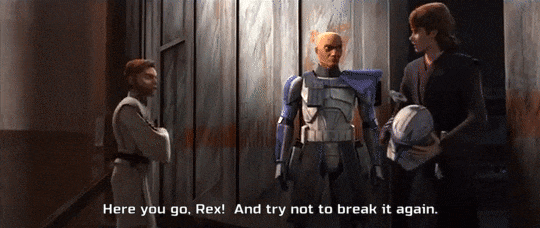
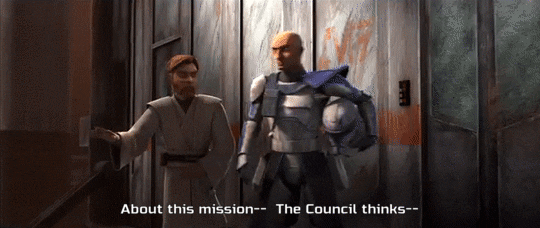
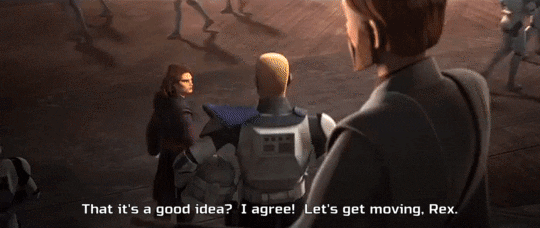

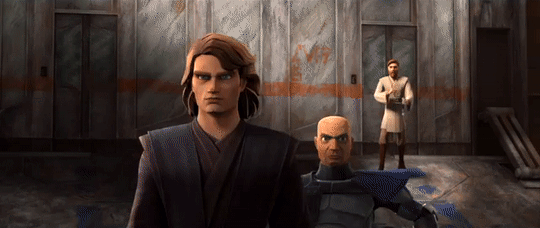
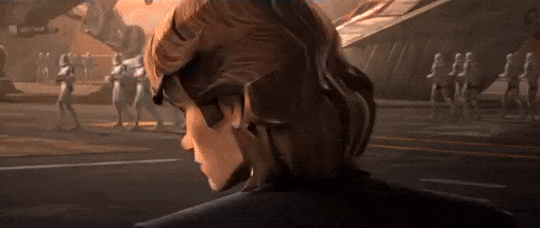

I LOVED THIS MOMENT SO MUCH.
I love it because of course Obi-Wan knows about Anakin and Padme and he’s not being subtle that he knows, that it’s something that’s been woven into the story since Revenge of the Sith.
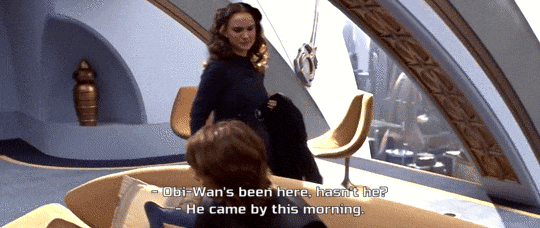

Anakin can sense Obi-Wan’s presence (because they’re so close, which is how the Force works, the closer you are to someone, the more you can pick up on their presence, which I think is part of what’s driving Anakin here, that it’s not just the visions he’s having of Obi-Wan being there for Padme’s pregnancy, but that he’s hurt and angry because he also feels betrayed that Obi-Wan is seeking someone else out, someone that’s not him) and Padme points out: He came by because of you.
It’s swept aside quickly because Anakin confesses that he feels lost, that nobody trusts him (again, he wants Obi-Wan’s trust, even when he’s been lying to Obi-Wan for ages, even when it’s Anakin who always turns away from the conversations Obi-Wan tries to have with him), and Padme points out that they trust him with their very lives.
But if you step back to look at this–why would Obi-Wan go to Padme to talk about Anakin, unless he knows that Anakin would go to her for someone to talk to and confide in?
Yeah, the original script had the conversation between Obi-Wan and Padme in it, where he revealed to her that he knew about them, but even without it, that’s still in the script. Even as early as when they crash landed half of the Invisible Hand on Coruscant, Obi-Wan was telling Anakin to go off and have his “glorious day with the politicians” because he knew.
And still yet more clearly, Obi-Wan knows. Not just that Anakin cares deeply about his friend, but that it’s put into the context of romantic feelings:
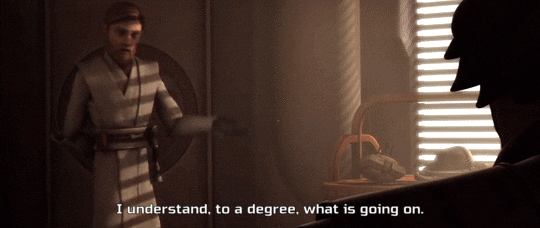
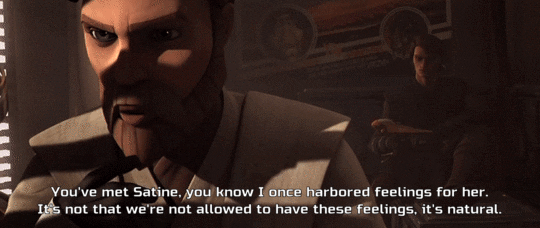
So, yeah, Obi-Wan knows how Anakin feels about Padme. He knows the context.
But that’s what makes the tie back to “The Rise of Clovis” or Attack of the Clones or even Revenge of the Sith, that it’s not that they have feelings that’s the problem, it’s exactly what’s highlighted in this episode with Anakin and Rex:
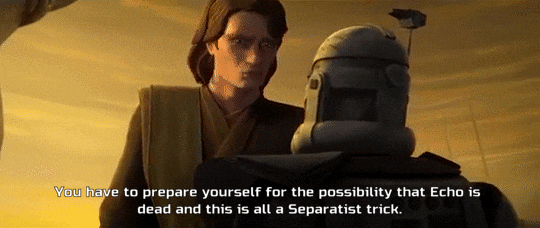
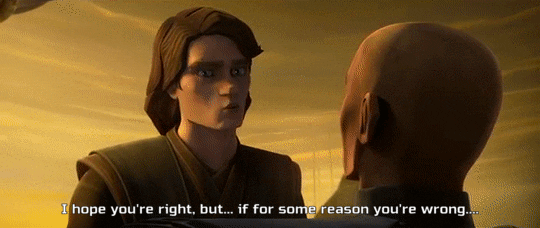
Anakin–THE SHEER IRONY OF ANAKIN SKYWALKER DELIVERING THIS SPEECH IS BEAUTIFUL AND SO POINTED–tells Rex that he has to prepare himself for the possibility that Echo is dead and this is all just a trick.
Ultimately, Rex knows that, if he’s wrong, then he’ll face that. But right now, he believes in his friend.
This is such an incredibly pointed parallel and contrast to Revenge of the Sith where the problem wasn’t that Anakin had feelings for Padme or that he wanted to save her, but that he let his fears override him because he couldn’t face the possibility that she might die and there was nothing he could do about it, he couldn’t face it at all.
And it was a trick by an evil agent out to get him, deliberately designed to draw Anakin over to the dark side!
This is why it makes perfect sense that Obi-Wan knows, not just because it’s been laid out already in previous movies and episodes, but because Obi-Wan knows Anakin isn’t getting a grip on himself. Oh, he believes that Anakin will, that’s Obi-Wan’s biggest blind spot, he cannot see the possibility of Anakin’s failure, because he believes so strongly in Anakin, he loves him so much and thinks the world of him, but that doesn’t mean he’s not aware that Anakin has a deep rage just by Obi-Wan saying Clovis’ name, it doesn’t mean he’s not aware that Anakin is still sneaking around to holo Padme, it doesn’t mean that he’s not going to keep trying to talk to Anakin and help him.
Yet, by continuing to hide it and refusing to face his deeper feelings, his fears and his growing attachment (as the Jedi use it, the definition where he cannot let her go when it’s time, that he’ll turn obsessive and possessive over her, he’ll prioritize his feelings for her over everything else to such an extent that he’ll literally murder children for it), Anakin is falling away from what he knows is right.
Anakin knows that it’s the right thing to do to prepare yourself for the possibility that you’ll lose someone. He has that wisdom and he’s imparted it on to Rex, someone he cares about very much, and wants to do right by. Anakin had the training and wisdom to make better choices in ROTS, we see that right here, that he knows you can work to save people, believe in them, but understand that sometimes you can do everything right, you can do everything you can think of, and still lose. He can even hear Obi-Wan say that he understands the feelings, knows that Obi-Wan will talk with him, that Obi-Wan is listening.
But he doesn’t want to make a choice, he doesn’t want to face his own growing internal darkness, he doesn’t want to turn to his friends for help. Despite that he had the wisdom to know better.
6K notes
·
View notes
Text
Fallout is fun because it’s supposed to be social commentary on society’s obsession with money, the damage caused by capitalism, the way that propaganda is woven into the fabric of our society, and the terrifying obsession we as Americans have with romanticizing our military and war in general.
And now they’re selling shit like Memorial Day and army themed items in their microtransaction shop, which uses currency named after the most devastating weapon in human history.
Fallout has literally become a parody of itself. Incredible. Good job, Bethesda.
24K notes
·
View notes
Quote
When we see violent characters who kill for primarily political reasons, they are often anti-heroes at best, outright villains at worst. The idea of the full circle revolution - of the secret dictator hiding in the throat of every rebel leader, waiting to leap out and betray the non-ideological hero - is utterly pervasive. It appears in videogames, where good old-fashioned all-American heroes like Jim Raynor of Starcraft or Booker DeWitt of Bioshock Infinite are betrayed by villainous revolutionaries Arcturus Mengsk and Daisy Fitzroy (and after all they’ve done for them!). It is common in films, from supervillains like Magneto and Killmonger, liberationists written as would-be conquerors, to the rebels of The Hunger Games, who vote to continue the games as soon as they’re in power, except with the children of the dethroned elite rather than the children of the poor. The same reversal is mentioned in A Song of Ice and Fire, where rebel slaves, once liberated, enslave their former masters; in the TV version, an evil fundamentalist visits the kind of cruelty on the King’s Landing nobility that they visited on others. In all these examples we see an echo of the primal fear of every oppressive class, the nightmare at the heart of modern white supremacy: what if someone did to us what we’ve done to them? Liberation is re-imagined as the world turned not so much upside-down but mirrored.
Alister MacQuarrie, Outlaw Kings and Rebellion Chic (via probablyasocialecologist)
9K notes
·
View notes
Note
I hope you do check out a Let's Play or something of RE2 remake! There's so much Leon/Ada content to go through, not just in their dialogue (cut-scene and in-game) but with body language, phrasing, and even just facial expressions and looks. And seeing the devs admit (in their Roundtable videos) that they made Leon and Ada fall in love too suddenly in the original and so they intentionally added more interaction to resolve, it's just so good to hear.
tumblr never notifies me of any msgs im sorry i didn’t see this til like forever later! but yeah that’s a valid thing for the devs to say, and if they did i’m optimistic that they wrote a good do-over. i’ll definitely check out a let’s play at the very least! any write-up i do for it will be weeks down the line at the earliest but you’ve totally convinced me 🤗i just wish i had paul mercier and sally cahill back :(
0 notes
Text
Daenerys Targaryen is The Great Other
Before anything else, this post perhaps should be read as a response to @nobodysuspectsthebutterfly‘s instructive and beautifully nuanced understanding of Daenerys’ characterization as well as her probable endgame in light of/ in response to what happened to the show, and in accordance to her role as a hero rather than a villain.
And how it’s still, for me, an uncomfortable possibility. I’m not talking about the sacrificial role that she may ultimately choose to save humanity, but the problem I have with the whole sequencing of events, particularly in Dany’s situation. Her character arc, which was supposed to parallel Jon’s, is centered around her fight against this actualized presence of slavery– a form of slavery that transcends borders and is so deeply institutionalized that it becomes the moral norm. I find it problematic that in her situation, the entities that she must realize as her ultimate enemies (as part of her own redemption arc or a reorientation to heroism) are essentially the metaphor (The Other) of the exact reality she was fighting in Essos, with an implication (not of nobodysuspectsthebutterfly’s, but what Martin’s text may effectively does ) that the great slavers and her situation in Slaver’s Bay only serve as a ground for lesson and an analogy to what will be her ultimate battle: The War for The Dawn.
One of the many criticism against white fantasy in literature is the need to make a fantasized representation of real social problems we deal with everyday as an attempt to (ironically) “democratize” and “localize” (or well, white-wash) these social struggles for the intended viewers to better understand and/or be made aware of the social dimension of the hero’s personal battle. It’s alongside those snide remarks that white people seem to only understand the problems of racism better if it’s transported in the fictional world and not presented as a pervasive presence in our real, mundane life. This is made effective in part because it allows the viewers to imagine themselves as a vehicle for change without making them aware that this is also the guilt they have to carry. If Martin intends The Others to be the ultimate representation of slavery itself (which I actually agree), he made the wrong move by making Dany’s storyline a soberingly honest reflection of real life situation and a re-imagining of our own enduring, worldly sociopolitical struggle. It defeats the purpose of the presence of this unreal but objective evil that the heroes must fight as their common enemy to preserve life.
Dany’s storyline stands in contrast with the whole narrative surrounding the existence of The Others because when it comes to her, the realization we should be having is not that we need to gather / forge light (the heroes) to ready for a the fight against the real, ultimate darkness that’s about to come; Dany, as a hero and a revolutionary, came into view because in Arendtian terms, we have been, and are already in dark times. It means, the bringer of lights come into play not because they were designed to fight evil, but because they become aware that something is actually oppressive, realizing that we live within a social structure that maintains the process of othering and dehumanization (even when the world tells them it’s not) and decisively chose to end it. It’s born out of social reflection and not out of prophecized destiny. There’s a reason why Dany’s character is so closely read as a revolutionary figure whose consciousness to fight for change, to end slavery, happens not because of her predetermined role, but because of the experiences she accumulated. It’s a fundamentally broken logic for me to make Dany’s entire anti-slavery campaign in Essos a secondary struggle, when shouldn’t it be the ultimate battle? Since, in the words of Melisandre and in the backdrop of the conversation between Dany and Mirri Maz Duur about what life truly means, it’s the fight for life itself.
There’s a conversation here about what makes evil, evil, or how evil is brought about. Martin is certainly not Manichaeian, but the presence of The Others allowed for a more comfortable avenue to locate who the objective enemies are in the series, which entity our heroes must fight for the sake of humanity. The popular narrative that the fandom tends to follow is that unlike the squabbling for lands and power, it’s different this time because the ultimate price of defeat is life. Yet, if we think about it, isn’t that what Dany has been fighting all along in Essos? She may fight for the Iron Throne, she may conquer lands and proclaim herself the queen, but ultimately these are all her way to save and preserve life. More importantly, her story pushes us away from the comforts of The Other, and towards what we should have come to know all along: who are responsible for the enslavement of people? Isn’t also us, humans? Aren’t we the creator of the monstrosity in this world? Unlike The Others whose narrative purpose is to present evil as a sort of future that will come upon us, as a sort of rare event as when “magic” comes back (to imply that it’s outside the realm of human existence) whose entire otherness makes our common humanity more cogent, Dany’s story makes for an argument that evil is a part of our history, it’s in the past, it already happened, that we made this happen. Because of our own superfluousness, our own thoughtlessness, through our own creation of the other (be it class, gender, or race), it’s often forgotten that collective responsibility is a response to our own collective guilt. There’s a reason why it never occurred to Dany to hold individual trials for the deaths of 163 children, why she doesn’t allow Barristan to make a case to differentiate between the Lannisters, the Baratheons, and the Starks, because be it by action or inaction, they did play a part in Dany’s own isolation, in the same way that her action and inaction put many of her people in despair and in total isolation (again, to say that Mirri Maz Duur has a point: Dany didn’t really save her). Here, she presents a more astute understanding of human condition. So while Jon is fighting this in the north, she is already fighting the same thing in the east. When you have two heroes whose stories run in parallel with each other, if you make someone march to the other side to join the other half, you are already making a value judgement: Jon’s fight against The Others will always be seen as the most crucial fight in comparison to Dany’s battle in Essos, when, again, like I argued, it shouldn’t be the case and to do so would carry highly problematic implications.
Dany understood this humanity’s own tendency to bring evil upon themselves, their own collective guilt, precisely because she is The Great Other in her own storyline. She is marginalized as a woman, marginalized as a child, isolated both geographically and in terms of how she’s the only protagonist among the key five who has no family to speak about or to protect anymore in a story that is about family. She has no nation to call home, marching from one place to another she can’t really belong. She is in perpetual exile, A Conscious Pariah; her own statelessness, her complete otherness and her constant preoccupation with the question who is she? allowed her to understand the plurality of identities, the constructive appearance of our world, and how inaction in the face of darkness is as evil as death; that our own lack of reflection with what we’re participating in spreads evilness around even though we don’t intend that to happen. As a third-culture kid, as a woman, as someone who has been othered throughout my life to control my behavior, to make me less “abhorrent” to “tame” me, to “discipline” me, I identify more with Dany as this stateless woman who’s trying to end slavery using her monsters more than anyone else, or any plot line, in the series. Her anger over the fact that slavers forget the names of the slaves that they claim are their most priced possession, the whole act of forgetting, of reducing someone to “slut” to “whore” to “monster,” is also my story. This is why many people of color are also seeing themselves in her position.
Dany is The Great Other, because her monstrosity casts shadow from above, that this time the ones you use for your entertainment are speaking for themselves now, reclaiming their identity, changing our worldly exterior so that the monsters won’t be seen as the others, that the people who are doing the othering are also the monsters, that slavery itself breeds this dehumanizing human connection. So Dany tries to help her people be less bad, as she over and over reflects on her own guilt. She is not letting anyone, including herself, off this hook. This degradation of human existence, this dehumanization, is our human problem; there should be nothing foreign or strange about it.
This is how rich her storyline is in Essos so much that when it turns out she will have to head West and join Jon to fight The Others, much more to choose to sacrifice herself to fight this abstraction of evil, I’m afraid it will ultimately cheapens the critical points in her storyline that speak for the humanity, the humaneness, the individuality, of the other that she happens to represent.
So, even if she becomes the hero, she is also ultimately defanged.
302 notes
·
View notes
Note
Wasn’t Daenerys’s behaviour supposed to be reminiscent of US intervention in countries like Vietnam or Iraq rather than representative of a revolutionary leader? And how is Daenerys a revolutionary in the context of Westeros? She has a claim because she was the last of the dynasty who ruled it and she had dragons because of that ancestery? Her aim was to reinstall a monarchy as her as the monarch, wasn’t it?
You gotta look at the bigger picture, because of fucking course the show wants you to buy the “she DOESN’T WANT TO END TYRANNY SHE JUST WANTS TO BE ON TOP OF IT, EVEN IF SHE’S TOO MAD TO REALIZE IT!” bullshit. But it IS bullshit. It’s a smokescreen to dress up their absolutely conservative political take as a *critique of imperialism and violent political leaders*.
Keep reading
218 notes
·
View notes
Text
Sansa as the embodiment of white femininity and white feminism
I have always felt alienated by Sansa Stark as a character. Born high-born and privileged, she epitomizes classic, traditional, feudalist white womanhood. In spite of how clever and hardened she has become, she still exudes an aura of, shall we say, white female purity that prompts fans to fight over her and viciously defend her, to the point that anyone who doesn’t immediately fawn over her is despised, called vicious slurs, and hated. Any female character in the show that clashes with Sansa is also hated.
Fans of Sansa have been known to mock Arya’s gender non-conformity and even claim that preferring Arya to Sansa is a form of “anti-femininity”; they have been known to call Daenerys a foreign whore/a colonizer/an “invader”, which as an immigrant I find amusing because being called an “invader” is one of the more mundane xenophobic insults we deal with; most recently, they have even been known to defend Northern racism and xenophobia, which Sansa has tacitly endorsed by showing hostility toward Daenerys and her armies, and openly questioning how to feed those armies before said armies were sacrificed for the sake of white Northerners, and some Sansa fans even made racist comments about Missandei, simply because Missandei made a gently critical comment toward Sansa in 8.03. This is how defensive people are of Sansa - if you don’t worship her, you’re branded persona non grata, a misogynist of the ages. Sansa fans, most of whom are white liberal feminists/liberal feminists in general, weaponize progressive misogyny to glorify Sansa at the expense of other female characters, and believe they are in the right for doing so (e.g. celebrating Dany or Missandei’s deaths, calling Cersei slurs, making fun of Arya’s gender norm-defiant habits). Yet if someone were to point out Sansa’s objective flaws, or the flaws in her storylines, they would be branded an irredeemable misogynist. Any analysis of Sansa’s flaws is waved away with “she’s traumatized; yet Cersei is stripped of her agency as a traumatized woman and assigned the trope of one-dimensional mad queen, while Daenerys is assigned pure villainy, rather than moral complexity, and her trauma is not allowed to be factored in.
I am a South Asian bi woman, and an immigrant. I have never been able to relate to Sansa’s story because she was born privileged and because she embodies a pure version of white womanhood that prompts people to be viciously defensive. This mirrors exactly how people are with regards to white women in real life. People will tear apart women of color for the sake of white women. Historically, men of color, especially Black men, have been beaten or killed if they so much as looked at white women “the wrong way”. White women have been able to weaponize “crocodile tears” to demonize women of color. When watching Game of Thrones, I was never very into Sansa as a character for this precise reason. Even before Season 8, even before I saw how the got/asoiaf fandom on Tumblr is, even before I knew that Sansa fans hate Daenerys, even before all of that, I was not able to like Sansa because she reminded me far too much of the vicious white women I grew up with, the ones who were beautiful and feminine and skinny and could bat their eyelashes one minute and get what they want. Sansa has gone through a lot, of course, and undeniably so, yet she is by far not the only female character who has gone through a lot; yet fandom expects that we worship her and only her, which is far too reminiscent of how I have been shoved aside or demonized for the sake of white women. Moreover, Sansa interacts entirely with only white people; it is no wonder that Daenerys, who is dubbed a foreign invader, and who interacts with many people of color, is more relatable as a character to me (and this is before even mentioning everything Daenerys does as a liberator).
I mention Sansa’s epitomization of a specific form of white femininity for a reason. Femininity is a co-construct of colonialism and patriarchy. White femininity could not be created without the concurrent rape, dehumanization, brutalization, and exclusion of women of color (including enslaved women from African nations, Indigenous women, and colonized women from Asia, Africa, and South America). I’m not going to go into more specific details about this because it requires a separate meta. In short, though, Sansa’s femininity is so alienating to me because it is not a femininity I could ever fit into. Being coercively masculinized is an experience most women of color can relate to at least somewhat, since most of us at some point or another have been excluded from white definitions of femininity and womanhood. For more reading, I highly recommend The Coloniality of Gender by Maria Lugones, especially if you don’t understand why I’m saying that femininity as we understand it is a product of both colonialism and patriarchy and what ramifications this has for women of color.
A common talking point I’ve briefly stated is that Daenerys is a colonizer/imperialist/white savior, perhaps as common as the point that she is fated to become a Mad Queen. It is expected by a small but vocal minority of this fandom that if you are a woman of color, or an “ally” to women of color, you’ll hate Daenerys and consider her to be a white feminist character. The voices of actual women of color who like Daenerys are completely erased in this scenario; in many cases, those of us who do like her are deemed ignorant, or told that we need to educate ourselves. Women of color who do like Daenerys, funnily enough, get called racist and misogynistic slurs by white Sansa fans, who are then the same fans that turn around and call Daenerys a white savior. This cliché that “hating Dany = being an ally to woc” is so popular that any time Daenerys is brought up, it is almost expected that a WHITE Sansa fan will say “she’s a white savior” or “y’alls white savior fave [….]”. It is evident that white women do not understand what white saviorism is or how it actually operates, especially when these white women act like Sansa herself isn’t white and high-born, or when they act like preferring Sansa to Daenerys is more progressive/less white feminist, or when they even go as far as claiming that preferring Dany to Sansa is “white feminism” even though, again, BOTH Sansa and Dany are white women (and GRRM only considered writing one of them as Black, and it wasn’t Sansa, my friends). Stripping fans of color of their voices and agency is not actually progressive. It’s not progressive to weaponize critical race discourse for the sake of fandom drama, or for fights between fans of two white female characters. It’s not progressive to tokenize women of color or racialized misogyny. It’s not progressive to claim that women of color who like Daenerys are white or stupid or can’t have their race card anymore or worship white people or that they should “take a 23andme” test or whatever, especially if the argument is that you should hate one white woman (Dany) only to love another (Sansa). Yet all of this is done in the name of Sansa, which again goes back to my point that her brand of white femininity is the dangerous and insidious type, the one that makes my skin crawl in trepidation.
By the way, I’ve debunked the “Dany is a white savior” argument here.
Anyway, that I as a woman of color am expected to care more about a hyper-feminine white girl who was born privileged and grew up privileged and is overtly classist and has done nothing revolutionary for marginalized people or the smallfolk than about a white woman who, while feminine, was born in poverty and exile, and has explicitly enacted revolutionary actions against slavers, rapists, and child abusers, all in the name of going against white feminism/white saviorism, is genuinely funny to me. All this just makes me feel even more that it is Sansa who is the quintessential white liberal feminist character, NOT Daenerys. In this world, the white feminist character is not the one who gleefully burns slaveowners and child murderers and is then reviled (by both the narrative and the fans) for doing so.
This is why Slavoj Zizek’s review of the Game of Thrones finale is so on point. By the way, Zizek is a famous Marxist academic. He’s not my favorite by any means, and I have a lot of problems with him, but if you’re going for leftist critiques of GOT, here’s one of many:
The one who remains (as the queen of the autonomous kingdom of the North) is Sansa, a type of women beloved by today’s capitalism: she combines feminine softness and understanding with a good dose of intrigue, and thus fully fits the new power relations. This marginalisation of women is a key moment of the general liberal-conservative lesson of the finale: revolutions have to go wrong, they bring new tyranny, or, as Jon put it to Daenerys: “The people who follow you know that you made something impossible happen. Maybe that helps them believe that you can make other impossible things happen: build a world that’s different from the shit one they’ve always known. But if you use dragons to melt castles and burn cities, you’re no different.”
Consequently, Jon kills out of love (saving the cursed woman from herself, as the old male-chauvinist formula says) the only social agent in the series who really fought for something new, for a new world that would put an end to old injustices.
So justice prevailed – but what kind of justice? The new king is Bran: crippled, all-knowing, who wants nothing – with the evocation of the insipid wisdom that the best rulers are those who do not want power. A dismissive laughter that ensues when one of the new elite proposes a more democratic selection of the king tells it all.
And one cannot help but note that those faithful to Daenerys to the end are more diverse – her military commander is black – while the new rulers are clearly white Nordic. The radical queen who wanted more freedom for everyone irrespective of their social standing and race is eliminated, things are brought back to normal.
Why am I as a woman of color expected to love/care more about the white woman who only spends time with other white people, most of whom are high-born and are xenophobic regardless, and who is handed her Queen status on a silver nepotist platter, but revile the white woman who spends time with people of color, has freed slaves, is a queen who is chosen by those who follow her, and fights for the smallfolk, only to be reviled by the men around her? It is precisely because Sansa is the personification of upper-class, nativist, xenophobic white womanhood, and she appeases the appetites of liberal feminists but is both soft and gentle enough to not be threatening to men, the same men who call Daenerys a crazy bitch for burning slaveowners, rapists, or the abusive traitor Randyll Tarly, and celebrate her death.
Dan & David, as stupid as they are, were clever enough to realize that by granting Sansa QiTN status, they would be giving breadcrumbs to her (mostly white) liberal feminist fans who only care about her and would see Cersei dead and defanged, as well as Daenerys dead and demonized, to get this achieved if need be (which is exactly what happened). They are also rich white capitalist men who thrive off propaganda. The argument that first she came for the slavers and rapists, then she came for the innocents, is explicitly white supremacist, capitalist, patriarchal propaganda, which D&D are happy to promote, because it aligns with their interests. It rings the same bells that “anti-fascists are the REAL fascists” or “BLM activists are the REAL terrorists” or “proletarian revolutionaries are all going to turn out like Stalin” because the same types of people (rich white men with neoliberal agendas) are churning out the same soundbites. And a lot of you fall for it, because as long as the precious, pure, angelic white woman, who is beautifully feminine, has the purity of a white bloodline, and can do no wrong, gets her happy yes queen ending, then we can turn a blind eye and root for Dany’s death.
Take note, of course, that all but one of the characters who gets a happy ending are white. Grey Worm is the only character of color with speaking roles and interiority left on the show; I do not count the unnamed Dornish Prince because, well, he’s unnamed, he doesn’t speak, and the Dornish don’t gain independence, despite 1) retaining independence against the Targaryens and 2) being as brutalized/fucked over by the Lannisters as the Starks were. Notably the Greyjoys, who sided with the revolutionary-turned-evil Queen, don’t get independence either. The North, belonging to the King’s Sister, does, and unquestionably so, without the consent of the people, and we are supposed to be satisfied with a happy oligarchy in which Brienne can write about a man who broke her heart and used her, and men can joke about brothels. The evil revolutionary queen dies early in the episode, some tears are shed for her, she’s called a tyrant, and then we’re done with her, and most focus on the real heroes: the Starks. Zizek points out:
…the last struggle between the Starks and Daenerys – ultimately between traditional “good” nobility (Starks) faithfully protecting their subjects from bad tyrants, and Daenerys as a new type of a strong leader, a kind of progressive bonapartist acting on behalf of the underprivileged.
We are told that the Starks ultimately earned their happy ending, even though Bran did not participate in the game of thrones at all, even though Sansa did nothing in the fight against either the Night King’s Army or against Cersei, even though Daenerys is the only one shown actually liberating marginalized people and ruthlessly holding their oppressors accountable. Dany is called a white savior for doing those things, and her mistakes in pursuing her anti-slavery agenda are held against her, and yet the same people accept nepotism and oligarchy without argument, again because they, from the beginning, accept the argument that traditional, isolationist, nordic feudalist white people are the real heroes, and anyone who defies this norm is a villain. Do we see a single scene of the Starks fighting on behalf of the serfs whose labor they profit off of? No, and yet we call Daenerys the “white supremacist” character, or the “mad” character, or the “tyrant”. This kind of propaganda is so successful in America, even among liberal feminists, because socialist revolution is synonymous with tyranny and anti-liberty in this country.
The woman who proposes breaking the wheel of rulers and freeing slaves and serfs around the world is actually turned into a villain at the very last minute. In fact, her killing of evil men is explicitly framed as evil, through Tyrion’s very speech to Jon in 8.06. She kills evil men, so of course it’s no wonder that she’s now gone mad and killed civilians. This is the same kind of warning that rich white people utter in real life; if we allow antifascists, or Black Lives Matter activists, or leftist feminists, or labor organizers to run amok, we’ll be overwhelmed by tyranny and anarchy and authoritarianism. So, instead, the woman who lived her life in privilege should be handed a royal status by her Brother the King, and we should cheer this on and accept this because she worked so hard and she went through so much and she’s so precious and clever and pure (development of her cleverness hardly being shown aside, we MUST accept that she is /the/ cleverest character on the show, because she had some snappy yes queen lines that we know to fawn over).
Daenerys has been far more threatening to the egos of male fans than Sansa has been over the eight years got has aired. It’s no wonder - Dany routinely kills evil men as Tyrion pointed out. Where we cheered on when Sansa fed Ramsay to his dogs or conspired against Petyr Baelish, we view Dany killing slaveowners, rapists, and child murderers as evil and as foreshadowing madness. This discrepancy in similar actions undertaken by two traumatized women is only possible because Sansa appeases the white liberal feminist appetite without threatening male viewers, white viewers, or capitalist norms, and because she does so with a more genteel face and a naive facade.
This is why, to me, Sansa is the ultimate white feminist character of got/asoiaf. We fall for her trap of white femininity and endorse the most egregious forms of racism and misogyny just for her sake, and we call it feminism and we call it progressive, and we sometimes even have the gall to claim it is pro women of color to do so. Yet the type of femininity and power Sansa has is exactly the kind that excludes women of color and, in real life, would necessarily feature the marginalizing, sidelining, or demonizing of women of color. That eerily xenophobic rhetoric is used against Daenerys is thus not surprising. If we aren’t too careful, according to both white liberal feminist fans of Sansa and according to white men, we’ll end up letting foreign revolutionary evil mad queens like Daenerys in our midst, and they’ll hold too many evil men accountable for their actions.
This is my analysis as a woman of color, one that is actually based on nuance and critical thinking rather than just parroting the same faux-progressive soundbites, so I sure hope so called “allies of WOC” don’t force me to like Sansa just because they want me too.
2K notes
·
View notes
Text
“The finale combines the rejection of a radical change with an old anti-feminist motif at work in Wagner. For Wagner, there is nothing more disgusting than a woman who intervenes in political life, driven by the desire for power. In contrast to male ambition, a woman wants power in order to promote her own narrow family interests or, even worse, her personal caprice, incapable as she is of perceiving the universal dimension of state politics.
The same femininity which, within the close circle of family life, is the power of protective love, turns into obscene frenzy when displayed at the level of public and state affairs. Recall the lowest point in the dialogue of Game of Thrones when Daenerys tells Jon that if he cannot love her as a queen then fear should reign – the embarrassing, vulgar motif of a sexually unsatisfied woman who explodes into destructive fury.
But – let’s bite our sour apple now – what about Daenerys’ murderous outbursts? Can the ruthless killing of the thousands of ordinary people in King’s Landing really be justified as a necessary step to universal freedom? At this point, we should remember that the scenario was written by two men.
Daenerys as the Mad Queen is strictly a male fantasy, so the critics were right when they pointed out that her descent into madness was psychologically not justified. The view of Daenerys with mad-furious expression flying on a dragon and burning houses and people expresses patriarchal ideology with its fear of a strong political woman.
The final destiny of the leading women in Game of Thrones fits these coordinates. Even if the good Daenerys wins and destroys the bad Cersei, power corrupts her. Arya (who saved them all by single-handedly killing the Night King) also disappears, sailing to the West of the West (as if to colonise America).
The one who remains (as the queen of the autonomous kingdom of the North) is Sansa, a type of women beloved by today’s capitalism: she combines feminine softness and understanding with a good dose of intrigue, and thus fully fits the new power relations. This marginalisation of women is a key moment of the general liberal-conservative lesson of the finale: revolutions have to go wrong, they bring new tyranny, or, as Jon put it to Daenerys:
“The people who follow you know that you made something impossible happen. Maybe that helps them believe that you can make other impossible things happen: build a world that’s different from the shit one they’ve always known. But if you use dragons to melt castles and burn cities, you’re no different.”
Consequently, Jon kills out of love (saving the cursed woman from herself, as the old male-chauvinist formula says) the only social agent in the series who really fought for something new, for a new world that would put an end to old injustices.
So justice prevailed – but what kind of justice? The new king is Bran: crippled, all-knowing, who wants nothing – with the evocation of the insipid wisdom that the best rulers are those who do not want power. A dismissive laughter that ensues when one of the new elite proposes a more democratic selection of the king tells it all.
And one cannot help but note that those faithful to Daenerys to the end are more diverse – her military commander is black – while the new rulers are clearly white Nordic. The radical queen who wanted more freedom for everyone irrespective of their social standing and race is eliminated,
things are brought b a c k t o n o r m a l.”
— Game of Thrones tapped into fears of revolution and political women – and left us no better off than before by philosopher and sociologist Slavoj Žižek
1K notes
·
View notes
Text
Daenerys and Drogon should have mirrored Aegon and Balerion
Rewatched Stormborn and it got me heated again. Saw Balerion the Dread and had Aegon get name dropped for the eightieth time. Definitely feeling robbed of a good narrative journey that not only would have satisfied Daenerys’ internal journey of finding home and her external journey of attaining the crown, but would have simultaneously mirrored the birth of Westeros as we know it via Aegon, with the death of the “wheel” as she undoes it.
He brought three dragons and while he didn’t make the feudalistic system of fealty, he merged the seven kingdoms and started this down the path it is on. Daenerys brings three dragons as well… To complete her Targaryen journey she needs to live up to her words and break the chains of the system, of the wheel. You have Drogon burn the throne that Balerion forged… But that isn’t the wheel. It’s a chair. Her death does not break the fucking wheel like Tyrion tells Grey Worm. It just flat out doesn’t. In fact, this is worse because the leadership is CLEARLY chosen out of nepotism and includes very questionable choices on grounds of competence (a master of coin who doesn’t understand loans? a maester who left after like three fuckin weeks? Davos over Yara is an interesting choice considering they don’t let her retain her crown… And then of course Tyrion. Who has spectacularly failed as hand multiple times now).
The nobles who choose Bran openly mock the idea that the people deserve any measure of power. This is simply just more of the same, with a different chair… The wheel is THERE and it is openly sticking out in the wide world to be gazed upon and yet you dare say she fulfills her role? Bullshit. She deserved to dismantle the system and undo the monarchical damage her family had done, to invert Aegon’s journey (a man, of conquest; a woman, of liberation) and bring a transitional system of change, to find home in herself and her family name but to simultaneously free herself of the damage it has done to her (including freeing herself of her father’s sins, and overcoming people’s insistence she fall to madness as he did), to stand amongst her CHILDREN as mother rather than as her SUBJECTS as ruler.
Like she didn’t get to break a damn thing. She didn’t get to confront the Targaryen legacy, she succumbed to it. When she talks to Jon in the dragonpit at the end of season 7, her dialogue is specifically about this! She loves her heritage but she knows her family has made grievous mistakes. That she comments on the poor treatment of the dragons says enough. They are HER children. That they allowed them to crumble…to fall…to misuse and devalue them, her children, she sees as horrible. But this is also how she feels of anyone subjected to subjection. How could you turn her. How could you deny her such a beautiful story. So that the Starks can all find their way home in the end, enact every revenge they have piled up, only to split up. Apparently only they get to self-actualise, along with Theon…who became a Stark. Amazing stuff here
#game of thrones#daenerys targaryen#daenerys deserved better#got meta#meta#watched all of season 7 again cause while yes it has major narrative blunders (literally everything tyrion suggests) seeing her in westeros#is so powerful for me. and i love her journey. and goddammit dragonstone is my favourite location on the show!!!!#fuckin nonsense to disallow this gorgeous being such a masterfully poetic and powerful journey of freedom and motherhood#instead you're like...actually lol. did you know. she was corrupted by power cause grief...and became her evil father. lmao aight. cool
4 notes
·
View notes
Text
I’m glad my shitpost about Daenerys is getting traction but I’m baffled that very few people have noticed that “Revolutionary Be Crazy” pattern, especially in a time when we are swarmed with superhero stuff.
Villains in superhero movies are always driven by “revolutionary” motivations. Thanos is, quite literally, worried about the ecological collapse of the universe. That’s the driving force of the character. He does not even want to be God Emperor of the Galaxy. His underlying desire is the same as a climate change activist, yet Thanos is the genocidal maniac to be defeated and the superheroes NEVER stops once to think whether Thanos’ concerns are legitimate or not.
In Nolan’s Batman trilogy, Bane gives a quasi anarchocommunist speech about how Gotham is engulfed in corruption for the sole benefits of those in power, prisons are a symbol of oppression and the police is shit. Why isn’t Batman the one giving this speech?
I could go on and on with examples.
This is not done solely to give nuance to the villains, because it is pretty much a pattern: the villain wants to break the system, and the hero is called to preserve it. The hero never ever questions the villain’s motivation.
Someone mentioned Star Wars: no, the heroes in Star Wars are not revolutionary. Star Wars, like Marvel movies and generic Hollywood flicks, is just another neoliberal fantasy. It’s standard good vs evil. Luke is just fighting an authoritarian regime (the baddies) and so is Rey, because as heroes, they have to. Because Evil Empire is bad, and we all know is bad. We all know that authoritarian regimes are bad. Luke does not want to break the system for the sake of it, and neither does Rey, even though Rian Johnson managed to slip some anticapitalist lines into the script. Neither Luke, nor Rey, nor any other goodie ever thinks what is going to happen once the Republic is restored and how to get rid of the flaws that caused the Republic to fall twice. In The Last Jedi, Kylo Ren is given the “break the system” lines with his speech to Rey about letting the past die to create a new world. In the prequel trilogy (and supplemental material like The Clone Wars), it was Anakin, the character destined to become Darth Vader, the one pressed because the Republic is shit, corrupted and cannot get stuff done. Padmé and Obi-Wan are “yeah man the system is crap, but do you want a dictatorship?”. Which, by the way, is exactly what happens.
Classic liberal centrist message: you want capitalism destroyed, boy? You get literally Hitler, or Stalin, or whatever. So shut up. Accept the current oppressive system because it could be worse.
Revolution ain’t good.
Revolutionaries are bad.
Status quo is good.
That’s why subversive lines are always given to villains, and why the revolutionaries are always the baddies.
I can think of one subtle exception: Hunger Games. Even though at the end the leader of the Rebellion turns out to be “as bad as President Snow” (lol) and the hero kills her instead of Snow (another lol), I would say the overall message is not pro system. President Snow might be Emperor Palpatine, but as opposed to Star Wars, Hunger Games clearly shows that the rich, the élite and the media enable Snow’s power and the oppression of poorer districts and are pretty much oblivious to their struggles.
Three big pop culture phenomena are ending this year, and they all shows a recurring motif:
Final biggest villain in Avengers is a character worried about ecological collapse.
“Final villain” in Game of Thrones is a character who has talked so many times about “breaking the wheel” and “ending slavery”. She turns into General Hux from The Force Awakens, but instead of blowing planets she’s talking about freeing slaves. The only other character who has lowkey defied the system and befriended demonized outsiders, is exiled.
Star Wars: big bad of the final movie is Palpatine. Whether Kylo Ren is redeemed or not (his redemption implies he gives up on “building the new galaxy” and “letting the past die”), the Republic will be restored anyway, the problems will never be discussed, so it can crash again for Episode X in 2050.
3K notes
·
View notes
Text
Comparing the character of Daenerys Targaryen to western imperialist powers and colonisers is a false comparison and shows just how dumb some of you are.
1 Unlike western powers Daenerys is not a “foreign invader”. She and her brother were forced into exile and to return to the continent of their literal ancestors. She has spent all her life in Essos, running from city to city, because she has nowhere else to go. She and her brother were alone, mostly unsupported for a large part of their lives and have had to rely on patronage of Targaryen loyalists. They eventually became “beggars”, so this is not a family with means to “invade”. It was the two of them and she is now alone.
2 Unlike western powers, Daenerys is the symbol of everything that stands against patriarchy. Daenerys is SOLD as a bridal-slave to a warlord, who after dying left her in a dangerous situation. She did not gain the title of Khaleesi by her own volition, so she had no intention to become Queen to begin with.. The people that became hers thought her nothing more than a brood mare, as is the nature of a woman in the cultures described in these books. This made her understandably depressed and suicidal. She found strength to live by believing in herself. And by showing herself to be resilient, she amassed a following of people, young and old, strong and weak, man and woman and child. Freed people.
3 Unlike western powers, the first law she sets is ordering the freedom of the enslaved, instead of exploiting its nature… Telling her people they can take off their collars. Despite having been raised on a continent that still supported slavery and would have allowed her to gain from it economically, she goes against it on moral grounds.
3 Unlike western powers, Daenerys has no institutional support (economic or political) that is able to fund a campaign that allows her to conquer territory or subjugate people. She’s climbing up the hierarchy of the city states’ power structure through both force and strategy and the support of the people. But she is not subjugating people, she is giving them power and agency.
4 Unlike western powers, she’s not in it for profit. She frees enslaved young soldiers and other people and asks of them only to do the same for others if they choose to follow her. She is dismantling the economic backbone of the world she was thrown into, all in the name of freedom, not profit. There is no economic or political gain [at least from the wealthy] in her actions. Quite the opposite.
5 Unlike western powers, she attempts to help the freedmen, despite the crash in economy by instituting systems and laws to help their self employment. This is the opposite of what western imperialist powers do, who leave the people to drown in debt and famine.
6 Unlike western powers, Daenerys is not colonising territory. Colonisation is the supplantation of native people and appropriation of a country in order to profit off the land’s resources and gain political power in new territory. Daenerys is not doing that. Firstly, her people are OF Essos and the cities she’s “conquering” are made up of Masters, merchants and freedman from all corners of the world. She’s not supplanting anybody, the Free Cities are inherently/imperatively made up of a multi-culture, or are rather multi-ethnic. Besides that, her army and following are there only to free people from their shackles and to ban any traditions that uses the enslaved. She has not attempted to change all their cultural heritage or its demographics. She’s actually tried very hard to uphold their cultural heritage, even when they seemed strange or unsettling to her.
6 As far as the white-savior trope… It’s very much a problem on the show, but in the actual books the enslaved are not all POC.. some are white. This resembles slavery in antiquity and early Medieval along the Mediterranean and not more modern Europeans history in which mostly west and central Africa were forced to supply enslaved peoples… Not what’s going on in the books.
Daenerys is more like… Che Geuvara I suppose. She’s leading a revolution for the people and against the “state”. I’m not surprised that GRRM and D&D would then turn her into a villain. It’s funny because GRRM wrote her… so he had absolute control over her story and actions and knows exactly what he wants to say and yet… he has no idea what makes an Imperialist… If that’s indeed what he’s trying to say with this character.
511 notes
·
View notes
Text
Dany was born running. Born hunted. Born into abuse. Born into believing she would never be anything more than a tool to bargain with in her brother’s pursuit of power. And then she finally stands in that thrones room. She finally gets to take in that breath of air she’d been holding in her whole life. No one could harm her now. No one could chase her, hunt her, abuse her, or imprison her. It wasn’t about the throne. It was about her life. She could finally just live. And as soon as that breath finished leaving her lungs, her lover – her partner in that life she would finally get to live – held her close, and drove a dagger through her heart.
That is how D&D finished the girl born running, hunted, abused, and sold. Killed by the person who vowed to love her and stand by her side, always. This was not Rose letting Jack’s body drift down into the water at the end of Titanic. This was not Christian holding Satine’s body after illness took her life in Moulin Rouge. This was not Romeo and Juliet, taking their own lives because being together in the afterlife was better than even the thought of never being together. This ending was a cruelty – to Dany, but also to Jon, to the actors and to the fans. Cruelty in the name of shock value.
2K notes
·
View notes
Text
“Daenerys turned evil because of misogyny!” nah, it ain’t it fam. Please folks, let me offer a different perspective.
Game of Thrones is a bourgeois centrist masturbatory fantasy written by someone who openly endorsed Clinton over Sanders in 2016 and now supports Joe Biden, adapted for screen by the son of an ex Goldman Sachs executive who worked for George W. Bush.
I grew up in a country where textual analysis is always done taking into account authorial intent. Every work of literature was analysed through the lens of the author and the political environment they lived in. Do not “Death of the Author” @ me.
That being said.
Daenerys was textually coded as the “Breaker of Chains” revolutionary who frees slaves and roasts their masters. Revolutionaries do not do well in American productions, whether on paper or screen. The “revolutionary (=anyone who attempts to break the status quo) fella as villain” is a fairly common trope in superhero stories. Villains such as Bane are always given “I’m here to break the system and end corruption” lines, and the superhero is the one called to preserve the status quo. To preserve the system.
The American hero will never yell “slay the masters”.
Long story short: revolution = bad. Status quo = good. The revolutionary is always fated to go downhill. Why? To show that revolutions are nothing but a source of death and destruction. Daenerys goes from burning slavers to torching kids. The road to hell is paved with good intentions. You want the oppressive Tsar gone? Careful boy, because you might get Stalin. The proletarian revolution is just not worth it.
D&D have gone to great lengths to tick every “5 Things Writers Should Never Do” box, using Tyrion as a mouthpiece to explain that using violence against bad people is wrong and centrism is good. For example, punching fascists is a downward spiral. You punch a fascist, and you enjoy it, so you start punching those who are harassing your friend. In 48 hours, you are punching random women and children on the street. That was foreshadowed when you started punching fascists. So, refrain from punching fascists. Compromise with them. If you punch a fascist, then you are just the same as them.
Daenerys has to turn evil evil, for bourgeois Jon Snow has to kill the revolutionary. The young, idealist bourgie has flirted with the revolution, but the revolution has shown her true nature. Anarcho-communist, politically savvy Drogon burns the Iron Throne. The threat of the revolution is gone. The Lannisters were good bois all along, as they never threatened to “break the wheel” or sumn. Nobles gather in the Dragonpit. They laugh at the idea of granting peasants rights. But that’s fine, because the bigger threat is gone.
Monarchy is out. Oligarchy is in. Self-elected technocrats gather at the table. Bronn, of all people, is Master of Coin. He really needs the bad pussy. Tyrion, who has failed at literally everything, participated in war crimes, and whose counsel to Daenerys was nothing short of disastrous and part of the reason she fell from grace, is never held accountable for his failures and gets to keep his job - like a proper Goldman Sachs executive after 2008.
Bourgie Bran is elected King. Surveillance state is on.
Nobody ever asked the smallfolk their opinion about this whole mess.
“What was the point of Game of Thrones?”
The Night King was the good guy all along.
To sum up:
Daenerys did nothing wrong
Authorial intent is important
It’s finally over, now you can move on and watch anime
3K notes
·
View notes
Text
Daenerys’ violent acts are justified and here’s why
(do NOT @ me about 8x5. it’s an absurd and laughable suggestion that she would commit this. this is in relation to all the comments various cast & crew have made about all her previous acts of violence being the justification for this preposterous heel turn. which was ridiculous.)
What the white male writers think: Daenerys’ relationship to violence is horizontal. All people are on a straight line. With this mentality, it becomes easy to say “she doesn’t know right from wrong. She will cause indiscriminate harm.” Inevitably, she will do evil.
What it actually is: people in this world (and for that matter, ours) are placed on a vertical line of privilege and a system of oppression upholds that.
Daenerys, who ought to be at the top (Targaryen) is actually lower down (persecuted at birth for the name, disenfranchised for her adolescent life) and the abuse she suffers and endures drops her lower and her being sold as flesh and blood brings her in deep mental and psychological closeness to those individuals on the downward slope of the line.
With this in mind, it is easy to see a few things:
1) She uses her built in privilege and position of relative power to uplift those less fortunate
2) She has experienced the depravity of oppression and so will not harm those not at the top of the line
3) She only uses violence from a low position on the line towards a position above. If Daenerys were to reach the peak of this line, her violence would exist ONLY to defend.
She is not motivated by the gain of power itself and a love of violence, but by the gain of power to dismantle power and a willingness to use violence to achieve that. It is absurd to have claimed that she was “always like this,” and that we should have seen it as inevitable and that she deserves what she got. That absolute power corrupts absolutely. Well, sure, if you’re a white guy. If you don’t know pain. Daenerys is a product of abuse, and I’m sorry but no, those of us who have lived this life…we don’t become our abusers. It isn’t ABOUT having the power to be the one in charge. This is Cersei’s motivation. She wants power to have power, because wielding power will allow her to say “fuck you” to everyone who ever denied her any or questioned that she was worthy of it. Daenerys understands that power is a transformative tool as much as it is the wheel she wants to destroy. She needs power to do it. She wants power to make power meaningless, not for everyone BUT herself (like Cersei) but for all people.
And if she is willing to destroy those who are currently in positions of power and abusing that power, then so be it. This is a world of death and destruction. You cannot simultaneously ask me to cheer for the deaths of some oppressors (High Septon, Frey’s, Baelish, Joffrey, Ramsay, and so on – the ones who, while evil, only hurt our White Favs) yet feel disgust for others (slavers, Varys, Viserys, the khals, etc – ones who hurt a woman revolutionary yall seemingly want me to hate).
So eager are you to tell me that war is awful and depraved, but only when undertaken by a woman. So terrified are you of having to question the system you benefit from that you will destroy and kill the one who wishes its destruction. Perhaps she is willing to destroy the ones sitting in privilege from this system’s existence. So what. If they would unshackle themselves from it and agree to disseminate their power and embrace a new system, she would not harm them. She is not evil for wanting to help those who are by design unable to help themselves. She would never turn on them. If she turns on you, well, you weren’t right to begin with.
TL;DR: violently overthrowing oppressors does not mean you will inevitably become a violent oppressor. it means the violent oppressors are dead and gone and the system can finally breathe. if you’re oh so sad that violent oppressors have been killed, that’s on you
#game of thrones#daenerys targaryen#got meta#im so done being told. it is so true of all revolutionary figures and proponents of social change#is violence the first option? no. never. but when violence is the arm that enforces oppression? how the fuck else do you expect to change i#you gonna ask real nice? is that gonna work????#daenerys even specifically refuses to harm innocents and will only attack those openly attacking her or another#and i shouldnt have to fucking explain to someone...that enslaving someone is an act of violence...#but she will only harm those doing harm. she is a guardian angel more than anything else. fearsome but only to those who have reason to fea#fear.... lol rip
1 note
·
View note
Note
Kit apparently said that Dany was bad from the very beginning and "we're culpable. We cheered her on." I cannot stand by the cast painting Dany as evil for her ruthlessness against terrible people while saying nothing about Sansa, Arya, Jon, Jaime, Tyrion, or anyone else doing the same thing in the series. It's blatant hypocrisy.
Virtually every main character in Game of Thrones has killed ‘evil men’ and we’ve cheered them on. By this logic, every viewer is ‘culpable’.
I want to clarify that this is not about whether or not these characters were justified in their actions, it’s just a list to show that the characters and fans gaslighting Daenerys are not and never were morally superior.
The point of this list is to prove that Daenerys is not that different from anyone else where morality is concerned, except that no one ever gave her the benefit of the doubt or considered whether or not her actions were justified.
What was Dany accused of prior to 8x05? (By characters and fans):
Having a temper
Killing her enemies in battle
Executing enemies
Executing traitors
Taking revenge
Executing ‘evil’ men guilty of what she deems a crime (slave owners)
Using a method of execution that 'makes people uncomfortable’ (fire)
Not preventing her brother’s murder and not being sad enough as it happened
These are the things that the fans and the men conspiring against her insist were warning signs that she was 'going mad’.
This is going to be a long, ugly post that will probably cost me some followers, but simply typing them out is not good enough because most fans have shorter memories than goldfish. Y’all need visuals.
No, I’m not bothering to put it under a cut either, because I’m trying to prove a point and the fact that it’s long only helps my case. 👍
Let’s take a look at the deeds of the oh-so-morally-superior characters, shall we?
Jaime Lannister oathbreaking by slaying his king
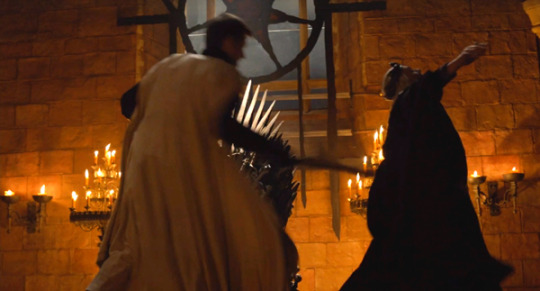
Jaime Lannister attempted to murder a child
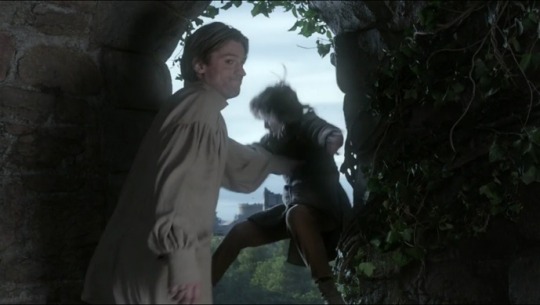
Jaime Lannister murdered Jory Cassel
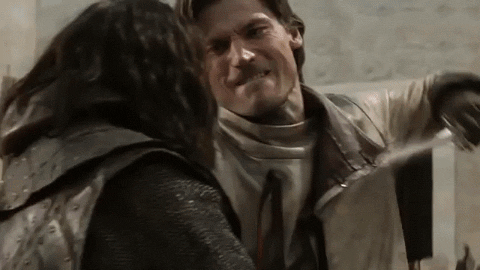
Jaime Lannister killed his enemies in battle, tried to murder Daenerys in battle
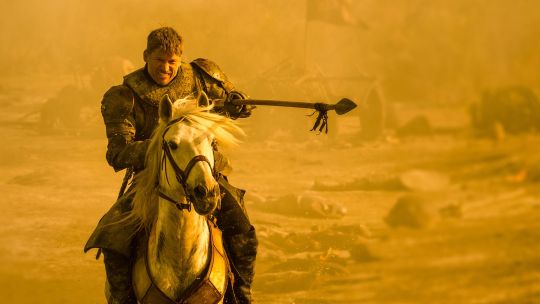
Jaime Lannister kinslayed, strangling his cousin
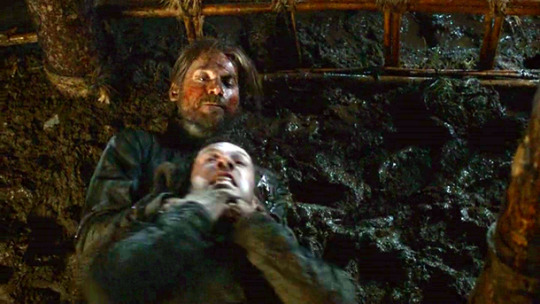
Jaime Lannister sacked Highgarden and left no survivors

Jaime Lannister murdered his enemy, Olenna Tyrell
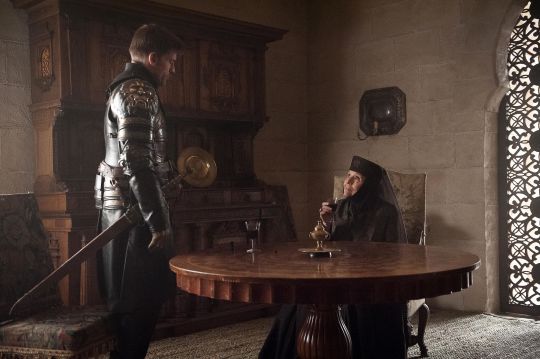
Tyrion Lannister killed his enemies in battle
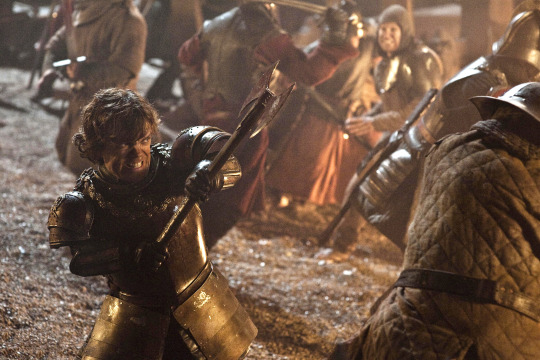
Tyrion Lannister professed his regret in ever defending King’s Landing
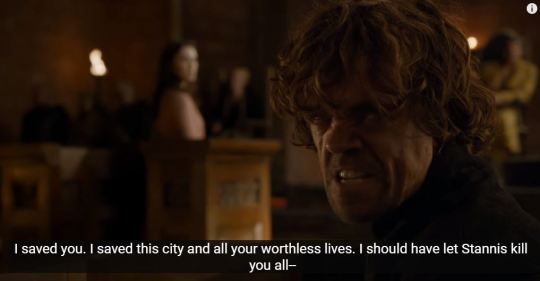
Tyrion Lannister vowed revenge on his sister
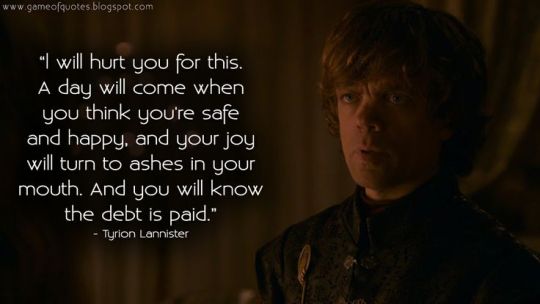
Tyrion Lannister kinslayed by having murdered his father

Tyrion Lannister murdered his lover after her betrayal (Shae)

Tyrion murdered his enemies with Wildfire


Tyrion and Varys committed treason against their queen, Daenerys
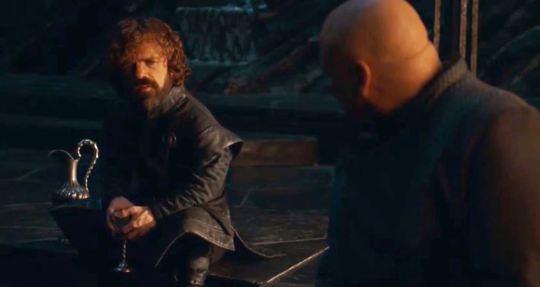
Varys encouraged Tyrion to seek revenge upon his sister
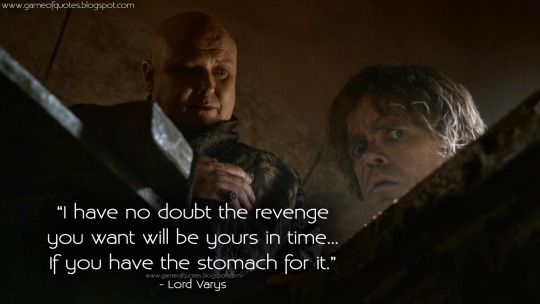
Varys tried to murder Daenerys via poisoning her food
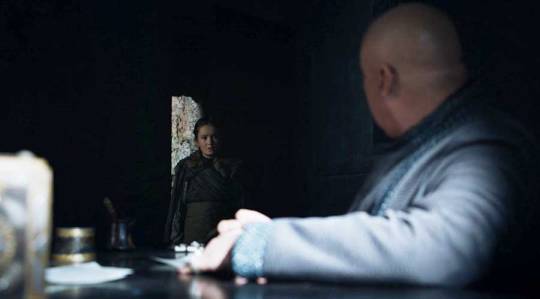
Varys kept a man in a torture box
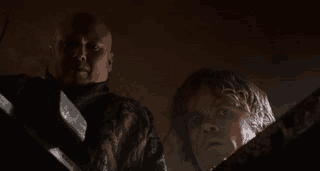
Jon Snow broke his Night’s Watch oaths/vow

Jon Snow murdered Qhorin Halfhand
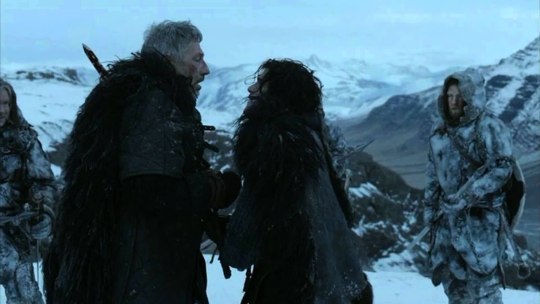
Jon Snow killed his enemies in battle
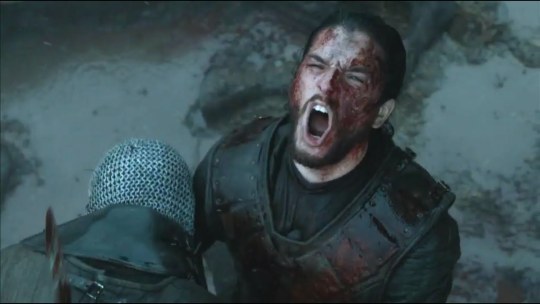
Jon Snow executed a man who disobeyed his order who cried and begged for his life (Janos Slynt)
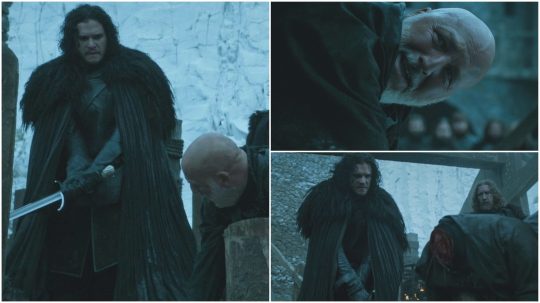
Jon Snow executed men who committed treason and conspired to kill him, including a child
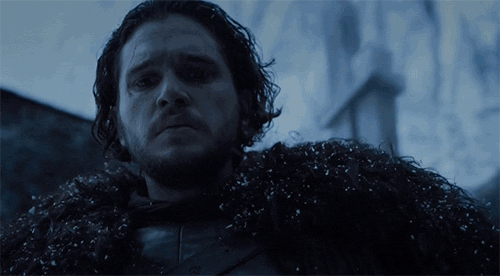
Jon Snow nearly killed a man with his bare hands
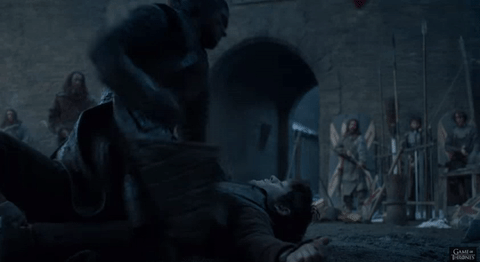
Jon Snow committed treason against his queen

Jon Snow kinslayed his aunt/murdered his queen in cold blood
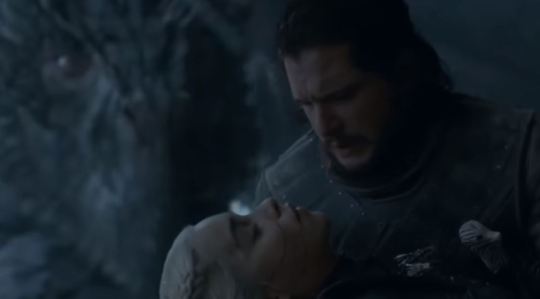
Sansa Stark executed Ramsay Bolton with dogs
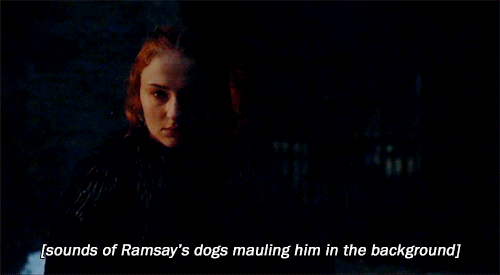
Sansa Stark committed treason against her family
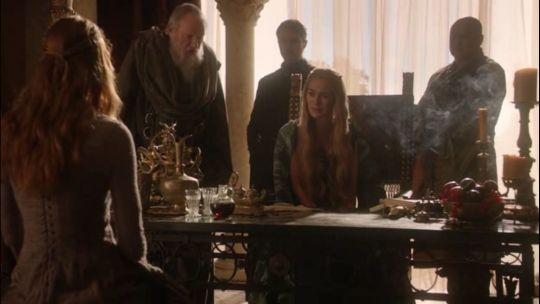
Sansa Stark lied to prohibit justice for her aunt’s murder
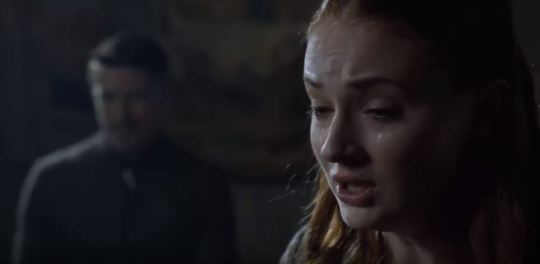
Sansa Stark broke an oath she swore in front of the heart tree
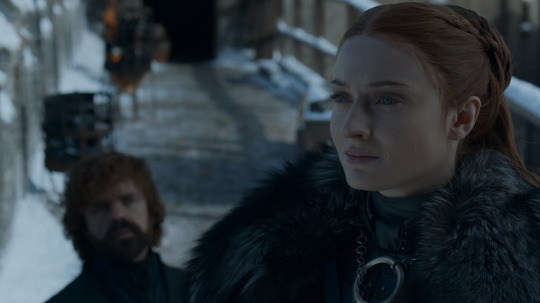
Sansa Stark ordered an execution without a trial
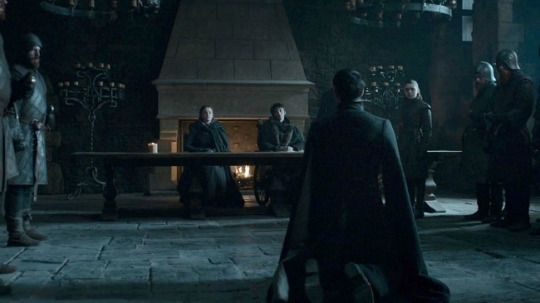
Arya Stark recited a murder list of future victims

Arya Stark killed an entire family regardless of individual guilt

Arya Stark baked the remains into a pie and fed it to the father
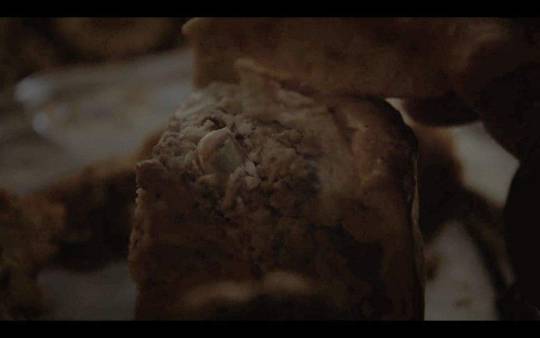
Arya Stark delighted in the murder of Walder Frey
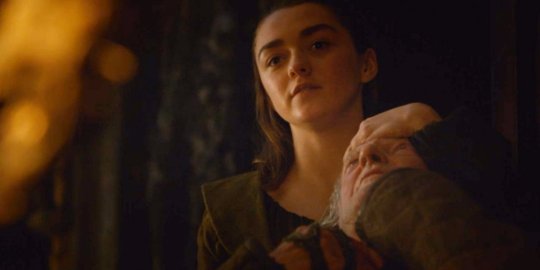
Arya Stark stabbed out the eyes of Meryn Trant before murdering him
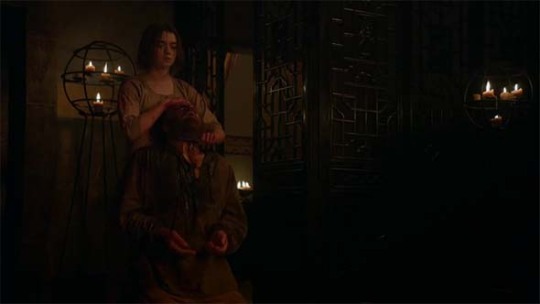
Arya Stark relished in the death of Polliver

Arya Stark very brutally tore off the face of the Waif and put it on display
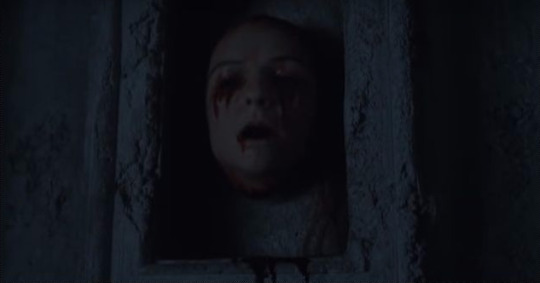
Bran Stark warged into Hodor against his will
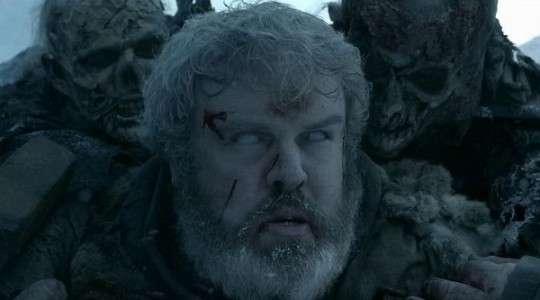
Bran Stark, who confirms he is aware of the future, moved the chess pieces around to maximize lives lost so that he could seize power
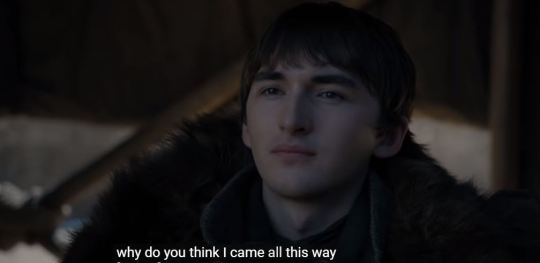
Let’s take a look at other characters who are held in higher moral esteem than Daenerys Targaryen (prior to 8x05):
Robb Stark executed Rickard Karstark for disobeying him
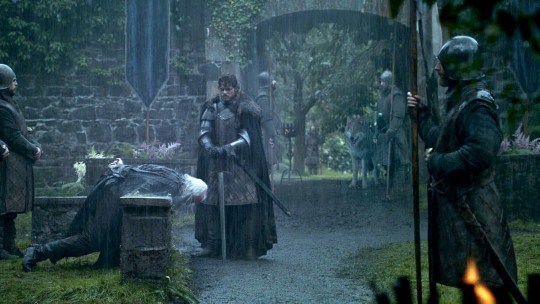
Robb Stark knowingly sent thousands of his men to their deaths for a victory

Robb Stark killed his enemies in battle
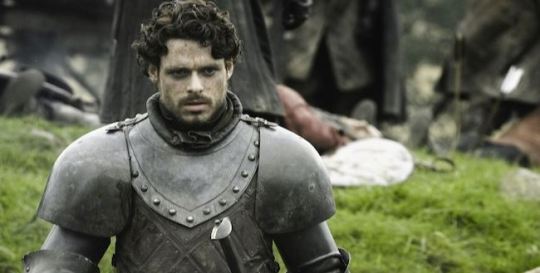
Ned Stark executed a man for what he deemed a crime (Will)
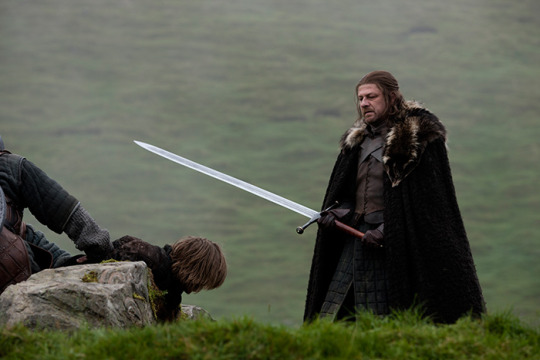
Ned Stark killed his enemies in battle

Sandor Clegane murdered a child on an order

Tormund Giantsbane killed innocents in raids
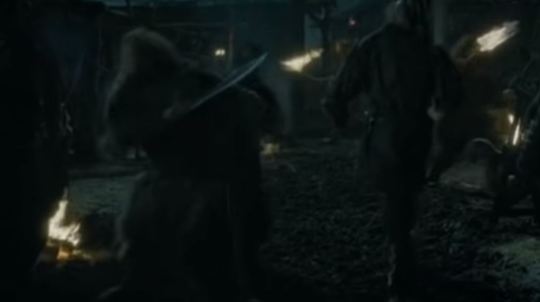
Ygritte killed innocents (including women) in raids
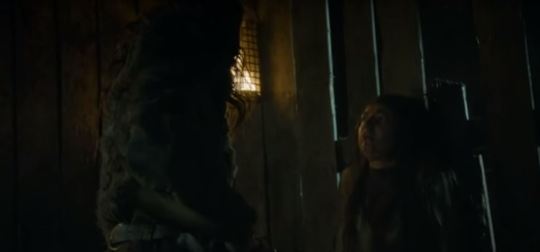
Ygritte killed her enemies in battle

Tormund killed his enemies in battle (and ate their faces)
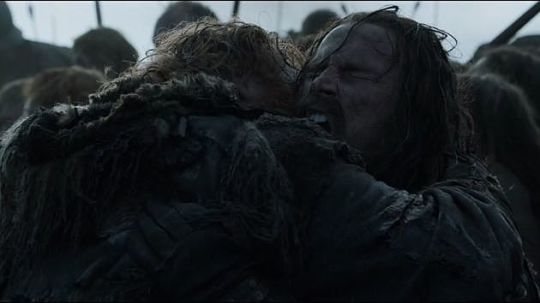
Randyll Tarly threatened to hunt and murder his heir

Randyll Tarly betrayed his liege lord Olenna Tyrell
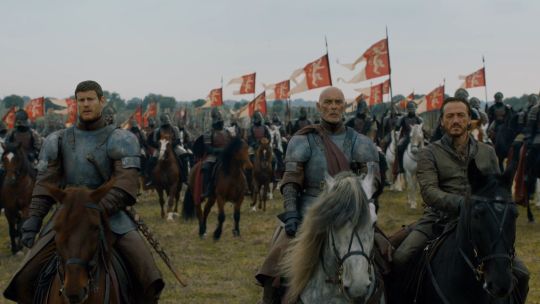
Randyll Tarly sacked Highgarden and left no survivors
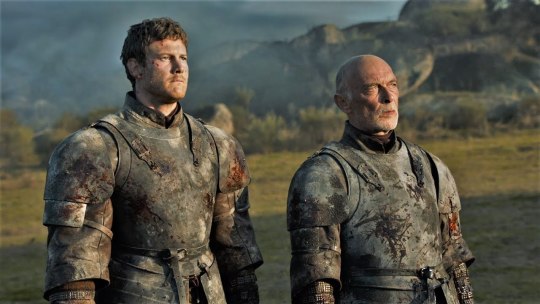
Melisandre poisoned a Maester for trying to kill her
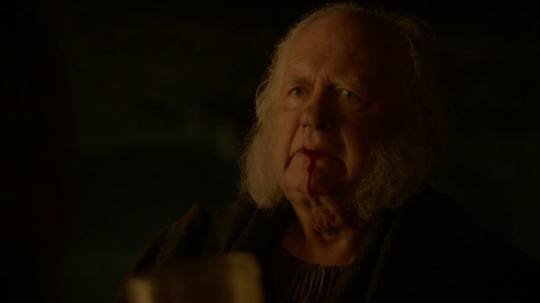
Melisandre burned non-believers alive
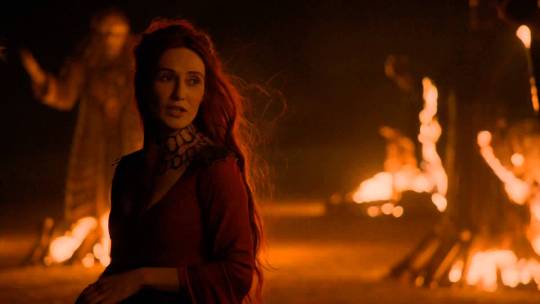
Melisandre burned an innocent child alive

Stannis and Selyse Baratheon consented to murdering their child
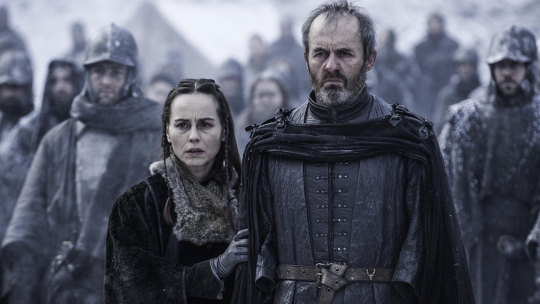
Melisandre and Stannis burned a man alive for refusing to bend the knee
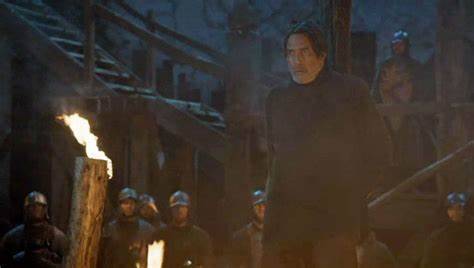
Melisandre and Stannis Baratheon (kinslaying) his brother via shadow demon

This list ain’t even exhaustive. This is just the shit I came up with off the top of my head!
Want to claim Daenerys Targaryen was always foreshadowed to be mad? Cool!
Now just admit everyone else in the series was foreshadowed as mad, too.
5K notes
·
View notes
Text
“But Daenerys becoming a villain is so subversive”
Hmm, is it?
Child by Rape Trope
In fiction, children conceived by rape are sometimes considered to be “tainted”, especially in horror movies where they often grow up to be either deformed Bastard Bastard killers or straight up monsters

Victim of Abusive Childhood Turns Evil Trope
Parents who are emotionally, verbally, physically, or mentally abusive, or who neglectfully allow their children to be abused by others if they don’t abuse the child themselves; sexual abuse is typically treated as a special kind of evil. Sometimes, the abuse at the hands of their parents becomes a Freudian Excuse for a villain
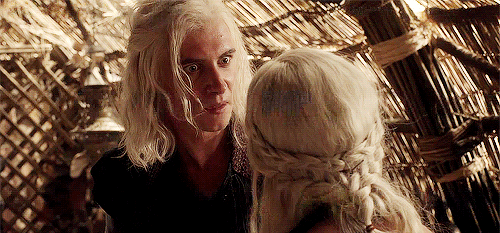
Inbred and Evil trope
Incest and inbreeding may serve as a Freudian Excuse of sorts for a villainous character
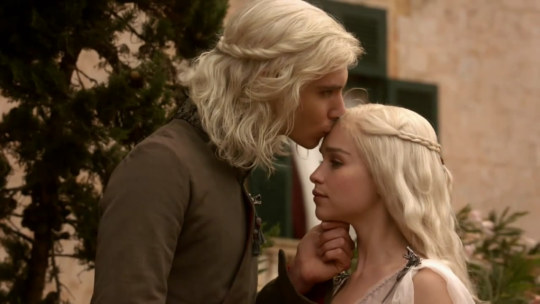
Dark and Troubled Past Trope / Like Father, Like Son Trope
Something terrible happened to a character; some tragic event in their past that shaped a fundamental level of their personality. Long after the event is over, it still has a powerful influence on the character’s life.
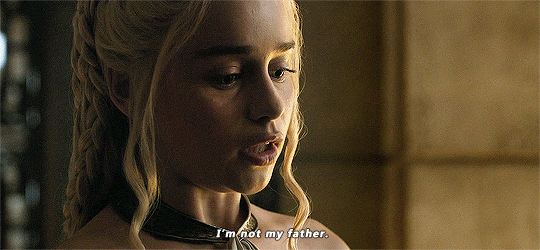
Dragons Are Demonic Trope
When it comes to representing evil, a common form it takes is that of the dragon. While in East Asia dragons were often seen as benevolent or at least neutral deities, the most common depiction of dragons in Europe, especially post-Christianity, were as evil beings that were often used as a stand-in for Satan himself when not working directly under him

Straw Matriarchy (Powerful Women are Evil) Trope
Women are shown to be fundamentally incapable of governing or utterly evil and castrating in their power-wielding

Women Who Enjoy Sex are Evil Trope
Sex is regarded as fraught and dangerous
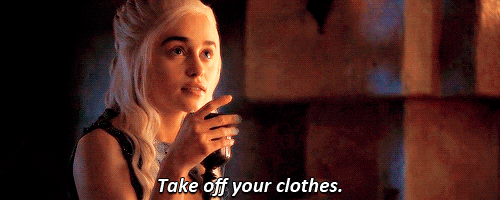
Status Quo is God Trope
Characters are bad for wanting to change society
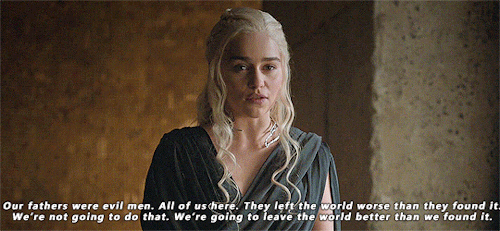
Infertility Drives a Woman to Evil Trope
Women with fertility issues are often portrayed as evil
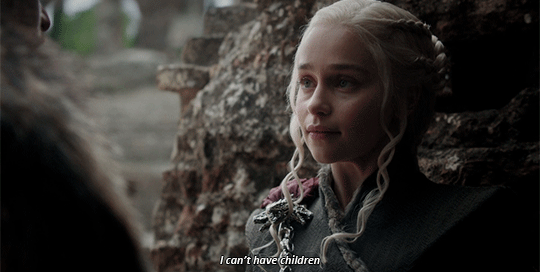
Woman Scorned Trope
What’s the only type of woman more dangerous than a Mama Bear? A woman who’s been dumped, cheated on, or otherwise done wrong by her significant other. Especially if she’s been hiding some sanity problems,
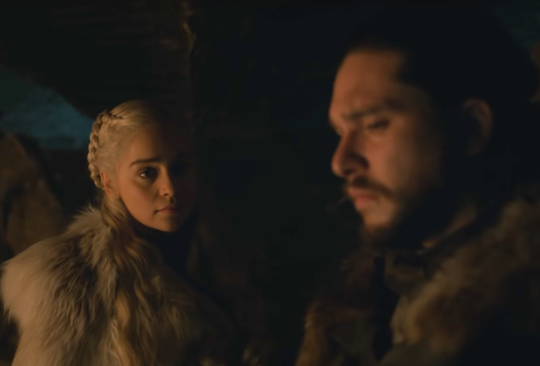
Secretly Selfish Hero Trope
A character known for noble deeds, selfless sacrifices and a lifetime of service. However, occasionally a nasty spanner is thrown in the works, and the hero is forced to question their fundamental motives: are his/her good deeds really performed for the benefit of others… or, deep down, are they doing these things for themselves, without even realising it?

Ambition Is Evil Trope
A character who aims to improve their situation in life, be it in terms of money, fame, or power. There is a high probability of this character starting out as evil or becoming evil very quickly.
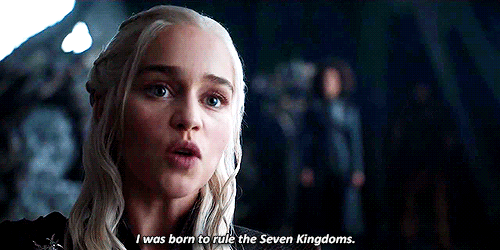
He Who Fights Monsters Trope
He who fights monsters should see to it that he himself does not become a monster

Fallen Hero Trope
You either die a hero or you live long enough to see yourself become the villain
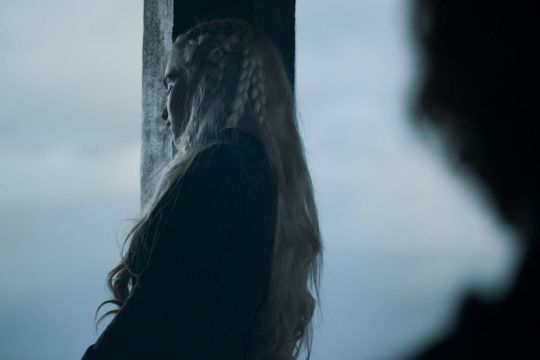
Hysterical woman Trope
Women as less rational, disciplined, and emotionally stable than men, and thus more prone to mood swings, irrational overreactions, and mental illness
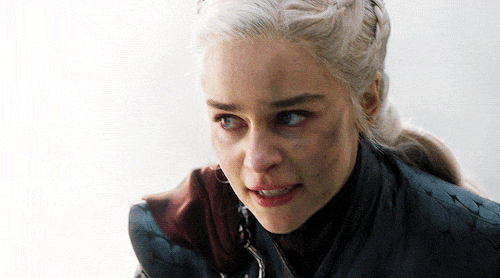
Would Hurt a Child Trope
The act of harming a child usually comes off as the ultimate act of villainy.
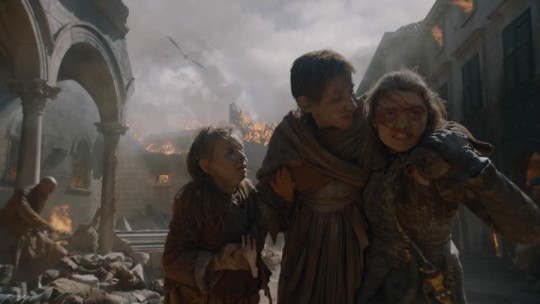
Complete Monster Trope
The Complete Monster is the most depraved of all characters; a villain utterly lacking in redeeming features.
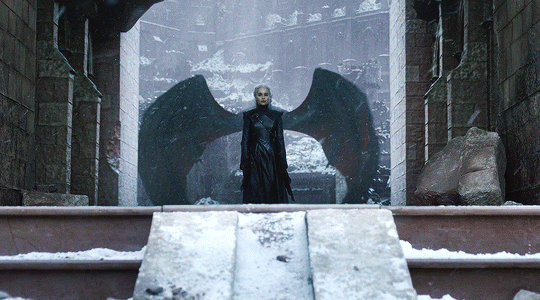
Well-Intentioned Extremist Trope
A villain who has an overall goal which the heroes can appreciate in principle, but whose methods of pursuing said goal (such as mass murder) are problematic; despite any sympathy they may have with their cause, the heroes have no choice but to stop them

God Save Us from the Queen! Trope
The Good Kingdom: A lovely, wealthy country ruled by a benevolent king, a wise prince, and a fair princess loved by the populace. But what’s that? There’s a queen? Oh, brother, we’re in trouble.
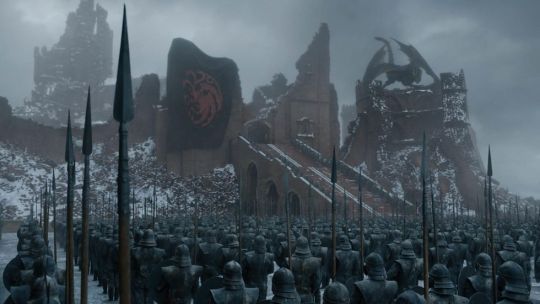
#women heroes are built up just to destroy them#it happens all the time#it's not fucking SubVErSiVe. and for that matter...#don't try to subvert something that hasn't come to pass yet. daenerys as a hero..#like as a massively popular woman hero in an internationally beloved and culturally big series#she just doesn't exist yet. daenerys was her. but nah we couldn't let it happen#had that SuBvErT that shit before it started because women don't get to be heroes#and you're stupid for cheering for them 🙄🙄 🙄
2K notes
·
View notes